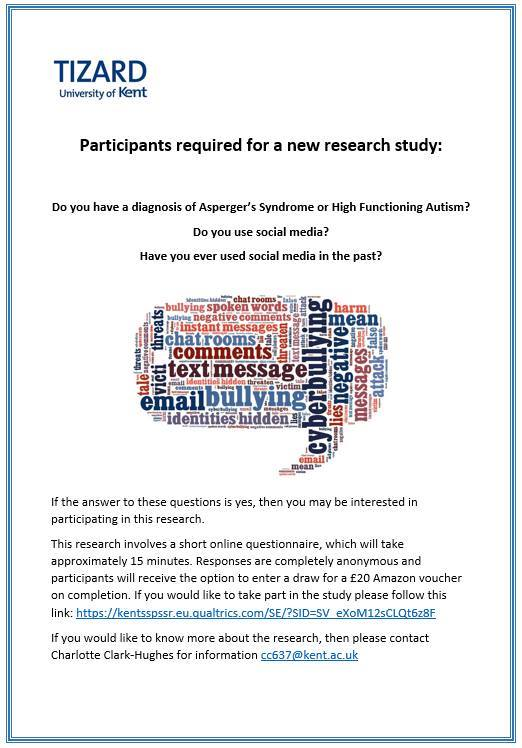We have been asked by Alec de Sausmarez of Exeter University with his PhD research.
He is looking to run a survey with people on the autism spectrum aged between 14-19. In particular with young autistic peoples’ use of social media. He told us “. I was inspired to carry out this research after reading many blogs from young people with autism who voiced that they feel that the internet has provided opportunities for them due to the nature of online interaction (e.g., less time pressures or difficulties with eye contact). My initial findings have suggested young people with autism feel that (and have real-life examples of) the internet helping them have opportunities to form relationships and be able to gain employment. I wanted my project to give this population a voice, which is why I felt it was important to get the views directly from the young people themselves. ”
What is the aim of the research?:
Phase 1: To explore young people with ASCs digital identity and its relationship to; ability to form meaningful relationships, psychological well-being and life outcomes.
Phase 2: To explore in-depth the views of specific young people with ASC (aged 14-19) with varied digital identity in relation to their digital identity; and how it influences their relationship formation, psychological well-being and life outcomes.
What will the project involve?:
For phase 1, young people (aged 14-19) with a diagnosis of ASC who are internet users, will be asked to complete a short questionnaire which looks at; digital identity, friendships, well-being and life outcomes. The digital identity, friendships and well-being parts of the questionnaire have been taken from other studies and all been standardized. At the end of the questionnaire each participant will be asked if they are willing to take part in phase 2; if so they can enter their email address. There will then be an online forum based discussion, where questions will be asked to ascertain more in depth information about the four constructs outlined; digital identity, friendships, well-being and life outcomes.
To take part please follow this link.
What happens to the data collected?:
The data will be analysed by Alec de Sausmarez for his doctoral thesis. The data will be analysed and a research report will be written. No data regarding individual participants will be published.
How is confidentiality maintained?:
No confidential data will be asked for during both phases of the questionnaire. All data provided will be treated as confidential and anonymous. All email addresses will be kept confidential on a password protected laptop. The only people who will see the raw data will be Alec de Sausmarez, Brahm Norwich and Margie Tunbridge.
Will we be paid for taking part?:
Unfortunately, there is no financial incentive for taking part in this study. However, the research may lead to ideas to support and aid the understanding of young people with ASCs use of the internet.
What previous experience does the researcher have?
I have a wide range of experience working with young people with ASC. I have worked in a mainstream secondary school in a learning support unit, a school for individuals with special educational needs, a variety of live-in residential camps and most recently in my current role as a Trainee Educational Psychologist.
Ethics and safeguarding:
There has been thorough considerations to ensure this project is ethical. Approval has been received from the University of Exeter’s ethics committee.
Where can I obtain further information if I need it?:
Please email ad564@exeter.ac.uk.



